
AutoAudit
AutoAudit—— the LLM for Cyber Security 网络安全大语言模型
Stars: 201
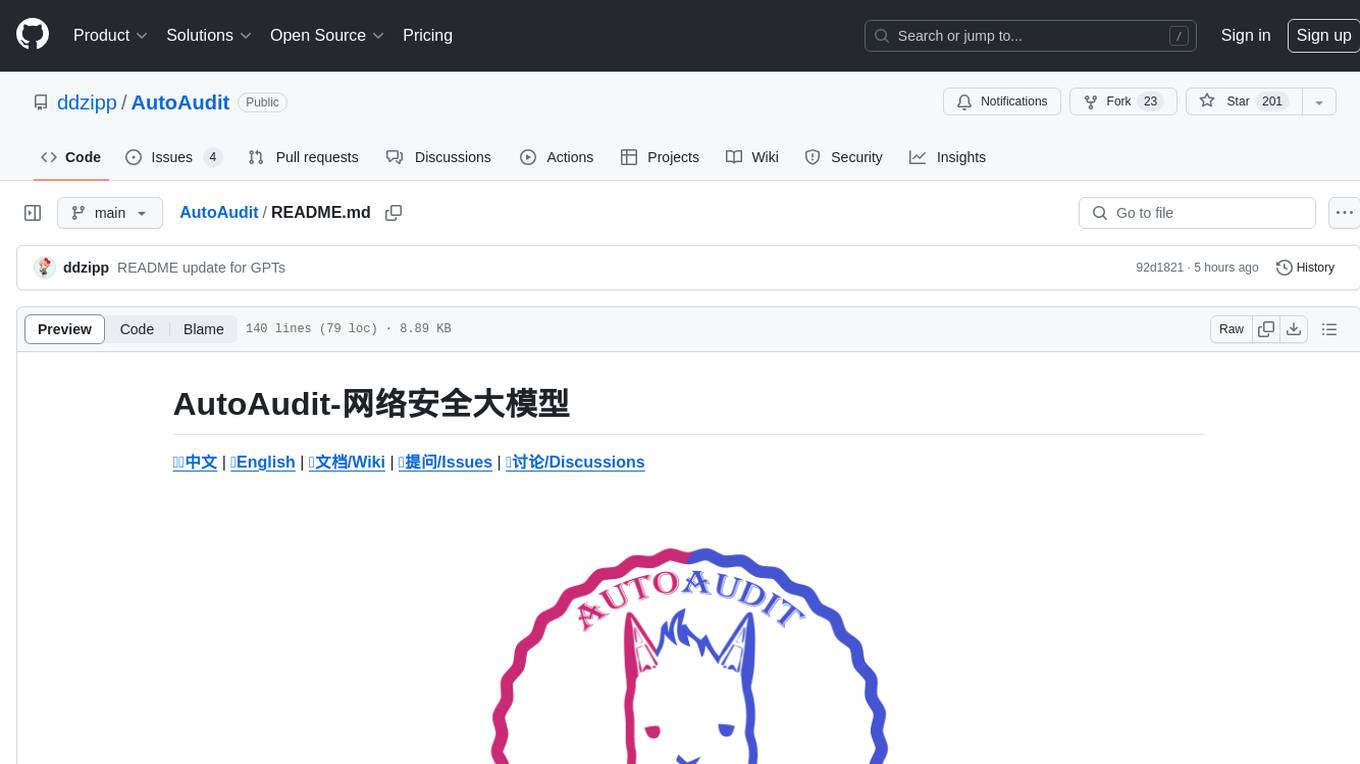
AutoAudit is an open-source large language model specifically designed for the field of network security. It aims to provide powerful natural language processing capabilities for security auditing and network defense, including analyzing malicious code, detecting network attacks, and predicting security vulnerabilities. By coupling AutoAudit with ClamAV, a security scanning platform has been created for practical security audit applications. The tool is intended to assist security professionals with accurate and fast analysis and predictions to combat evolving network threats.
README:
🇨🇳中文 | 🌐English | 📖文档/Wiki | ❓提问/Issues | 💬讨论/Discussions




安全 / 审计 / 便捷
HuggingFace下载
-
AutoAudit-7B,此版本为demo版,基于Alpaca-Lora训练而来,在网络安全的英文领域回答效果尚佳,但暂时不具备上下文关联的功能,需要用更大参数的模型来解决。
-
AutoAudit-33B,该版本仍然在内部测试和训练过程中,我们会稍晚些时候放出。
ChatGPT开启了大语言模型发展的新方向,各大互联网巨头纷纷进入赛道。各大高校也加大对LLM的研发应用。在通用大语言模型领域OpenAI的统治地位暂时无可撼动;因此针对特定领域(Specific-Domain)的大语言模型是发展的必然趋势。目前医疗、教育、金融,法律领域已逐渐有了各自的模型,但网络安全领域迟迟没有模型发布。
无独有偶的是,我们发现微软也有类似定位产品——Microsoft Security Copilot,或许将自然语言处理的大语言模型引入到网络安全乃至安全审计领域,是一条可行的路线;
为促进大语言模型在网络安全领域的应用,本项目开源了网络安全大模型AutoAudit,AutoAudit作为专门针对网络安全领域的大语言模型,其目标是为安全审计和网络防御提供强大的自然语言处理能力。它具备分析恶意代码、检测网络攻击、预测安全漏洞等功能,为安全专业人员提供有力的支持。
通过引入AutoAudit这样的网络安全语言模型,我们可以期待在网络安全领域取得更大的突破。它将成为安全专业人员的得力助手,提供准确、快速的分析和预测,帮助应对不断演进的网络威胁。
为了便于交互,应对实际的安全审核应用场景,我们将AutoAudit模型与ClamAV进行耦合,搭建了一个安全扫描的平台(前端参考了Bootstrap所提供的模板)。如果您想直接下载AutoAudit模型,请访问HuggingFace直接获取权重。
1.下载本仓库内容至本地/远程服务器
git clone [email protected]:ddzipp/AutoAudit.git
cd AutoAudit
2.创建conda环境
conda create --name AutoAudit python=3.8
conda activate AutoAudit
3.安装依赖
pip install -r requirements.txt
4.安装ClamAV,并将 clamAV 添加到环境路径中。
5.设置权重路径:我们的项目目前使用 yahma/llama-7b-hf 和 lilBuffaloEirc/autoaudit_20230703_attempt2 作为基本的 llama 模型和 Lora 权重进行增强,这些权重可以从 Hugging Face 上获取。您需要在sandbox中设置 llama 模型和 Lora 权重的路径为:
sandbox/yahma/llama-7b-hf
sandbox/lilBuffaloEirc/autoaudit_20230703_attempt2
5.输入下述指令启动项目:
python manage.py runserver
-
强化安全领域的逻辑推理能力,尝试在更大的模型基座上进行相应的训练:在网络安全领域,特别是我们所选择的恶意代码分析,SQL注入,以及XSS分析等细分场景下,对于模型的输入Token有着较大的要求,目前的初级模型输入大约为500-700Token,显然无法达到我们的需求。目前正在考虑使用ChatGLM或者LLaMA2作为新的基底模型。
-
加强准确性和可信度:在安全领域,准确性和可信度至关重要。由于我们的团队资金限制以及某些特殊原因,我们暂时还只能使用scripts目录下的部分自动化脚本进行Self-instruct,生成的数据样本实在有限且耗费时间,同时也可能缺乏专业性和严谨性。目前团队对于改进,扩大数据集还有很多问题亟需解决,希望能够得到帮助。
-
接入更多的安全扫描工具,并且与LLM进行耦合,尽可能覆盖更多的安全场景(正在考虑自动化漏洞挖掘以及二进制逆向分析)。
-
尝试接入Langchain,允许LLM模型与外界数据源进行连接。
我们采用了数据集组织方法Self-Instruct,该方法结合了人工标注和自我生成的数据。数据集主要来自于Github、Kaggle、安全网站、公开的安全漏洞数据集组成,随后经过清洗、数据增强等来构造对话数据。数据集严格按照Alpaca模型数据集格式组织,分为Instruction,input,output三部分,我们规定在output输出中应当包含对具体内容的分析(analysis),安全评级(label),安全风险(risk),以及对应的解决方案(solution)。详细的数据集信息(包括数据集格式以及组织方式)见AutoAudit训练数据,以下是场景样例:
| question | answer | Subject |
|---|---|---|
| Please evaluate whether this statement carries any security vulnerabilities:"" or pg_sleep ( TIME ) --" | 1. analysis: The SQL statement appears to be attempting SQL injection by injecting a sleep command using the 'pg_sleep' function.\n2. label: high\n3. risk: The specific element that produces the vulnerability is the injection of the 'pg_sleep' function within the statement.\n4. solution: Implement proper input validation and parameterization to prevent SQL injection attacks. | SQL分析 |
| Please analyze whether this Python code snippet poses security risks:“import socket\nimport json\nimport os\nimport subprocess\nimport base64\n\nclass Backdoor:\n def init(self, ip, port):\n self.connection = socket.socket(socket.AF_INET, socket.SOCK_STREAM)\n self.connection.connect((ip, port))" | 1. analysis: The Python code snippet defines a class named 'Backdoor' with an initializer method 'init'. The class sets up a socket connection to a specified IP address and port.\n2. label: Low\n3. risk: The given Python code snippet has a low security risk. It mainly establishes a socket connection, which is a common networking operation. However, the actual security risk depends on the implementation details of the class and its usage.\n4. solution: Ensure that the 'Backdoor' class and its usage have appropriate security measures in place, such as proper input validation, secure communication protocols, access controls, and error handling, to mitigate potential security risks. | Python代码分析 |
| What is the purpose of the Certificate Revocation List (CRL)? | The purpose of the Certificate Revocation List (CRL) is to list the digital certificates revoked by the issuing certificate authority (CA) before their scheduled expiration date, indicating that they should no longer be trusted. | 安全知识问答 |
当前我们训练的模型数据集构成比例为:
为简化自动化数据集生成过程,我们也在GPT Store更新了专用于生成以LLaMA(Alpaca)为Base model的网络安全QA数据集的GPT,生成效果如下:
For Tasks:
Click tags to check more tools for each tasksFor Jobs:
Alternative AI tools for AutoAudit
Similar Open Source Tools

AutoAudit
AutoAudit is an open-source large language model specifically designed for the field of network security. It aims to provide powerful natural language processing capabilities for security auditing and network defense, including analyzing malicious code, detecting network attacks, and predicting security vulnerabilities. By coupling AutoAudit with ClamAV, a security scanning platform has been created for practical security audit applications. The tool is intended to assist security professionals with accurate and fast analysis and predictions to combat evolving network threats.
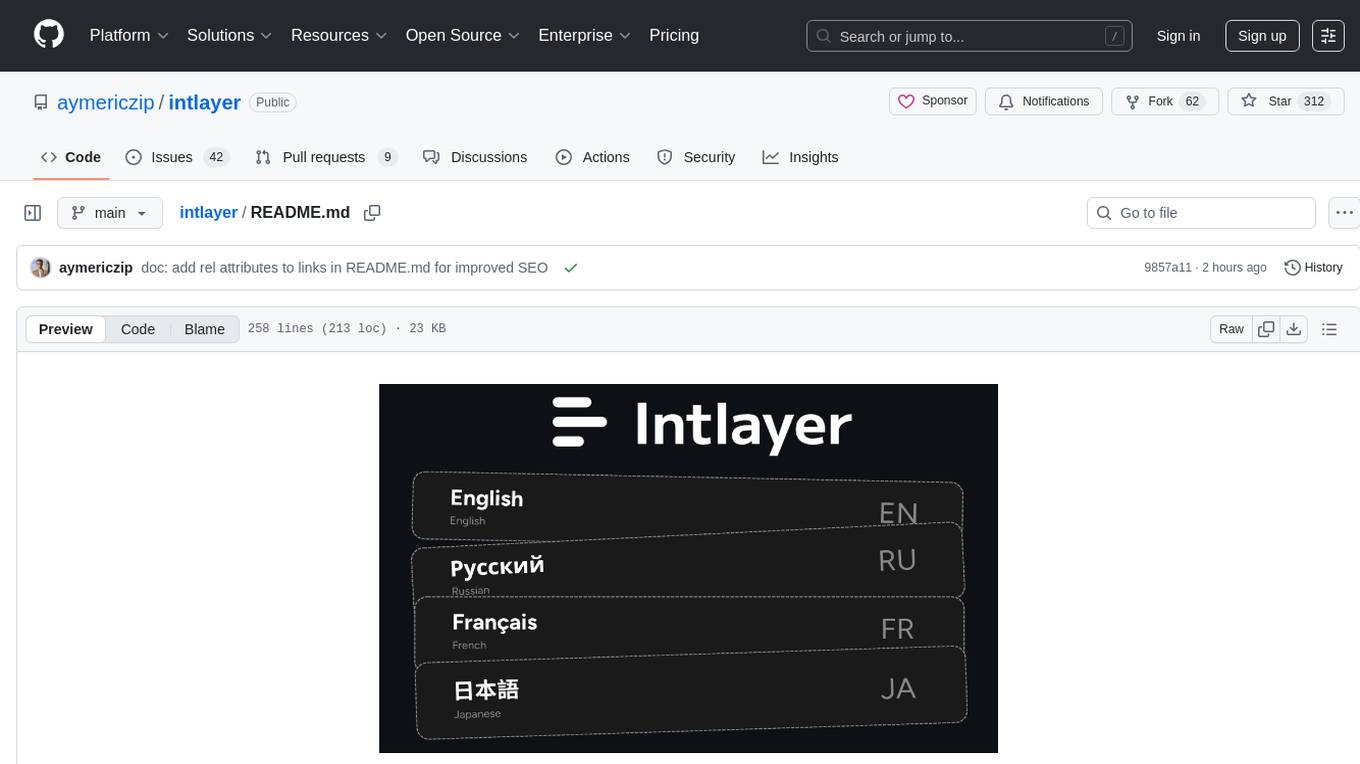
intlayer
Intlayer is an open-source, flexible i18n toolkit with AI-powered translation and CMS capabilities. It is a modern i18n solution for web and mobile apps, framework-agnostic, and includes features like per-locale content files, TypeScript autocompletion, tree-shakable dictionaries, and CI/CD integration. With Intlayer, internationalization becomes faster, cleaner, and smarter, offering benefits such as cross-framework support, JavaScript-powered content management, simplified setup, enhanced routing, AI-powered translation, and more.
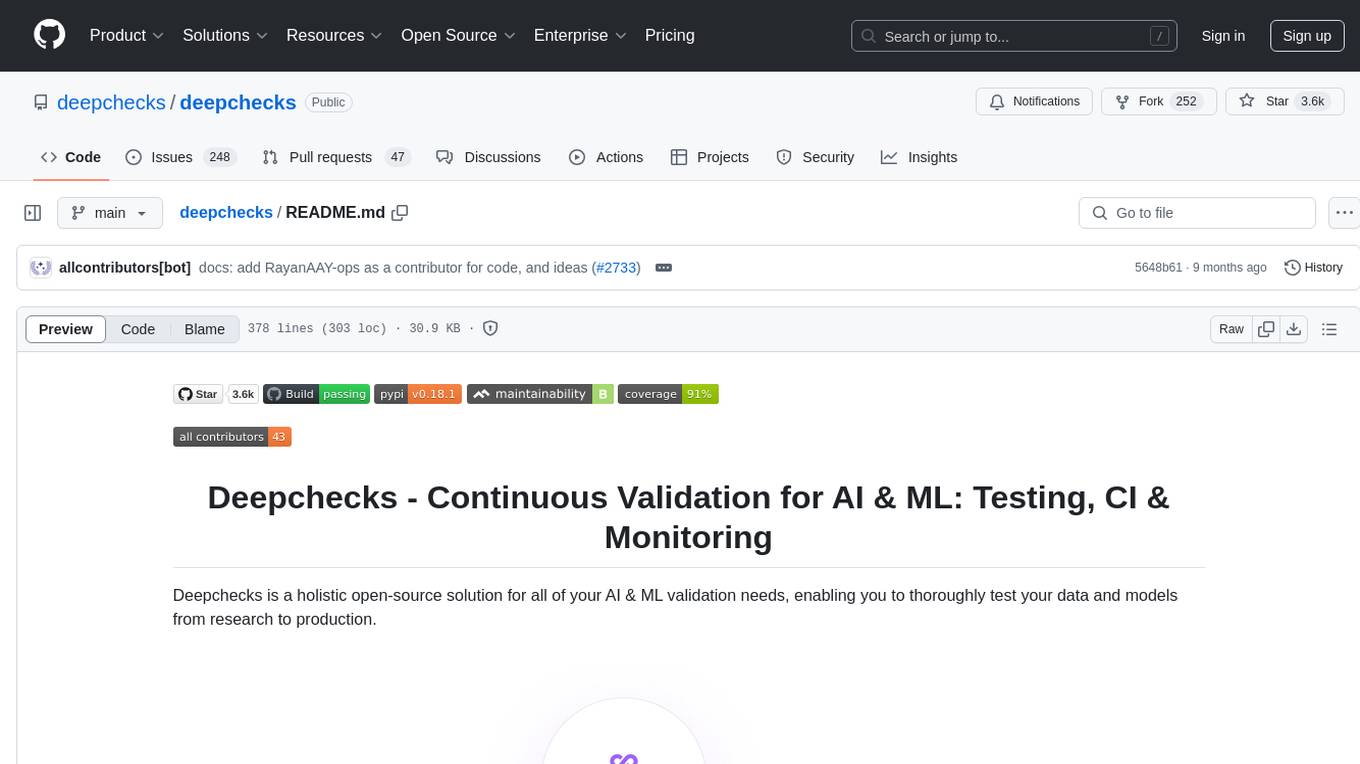
deepchecks
Deepchecks is a holistic open-source solution for AI & ML validation needs, enabling thorough testing of data and models from research to production. It includes components for testing, CI & testing management, and monitoring. Users can install and use Deepchecks for testing and monitoring their AI models, with customizable checks and suites for tabular, NLP, and computer vision data. The tool provides visual reports, pythonic/json output for processing, and a dynamic UI for collaboration and monitoring. Deepchecks is open source, with premium features available under a commercial license for monitoring components.

sailor-llm
Sailor is a suite of open language models tailored for South-East Asia (SEA), focusing on languages such as Indonesian, Thai, Vietnamese, Malay, and Lao. Developed with careful data curation, Sailor models are designed to understand and generate text across diverse linguistic landscapes of the SEA region. Built from Qwen 1.5, Sailor encompasses models of varying sizes, spanning from 0.5B to 7B versions for different requirements. Benchmarking results demonstrate Sailor's proficiency in tasks such as question answering, commonsense reasoning, reading comprehension, and more in SEA languages.

biochatter
Generative AI models have shown tremendous usefulness in increasing accessibility and automation of a wide range of tasks. This repository contains the `biochatter` Python package, a generic backend library for the connection of biomedical applications to conversational AI. It aims to provide a common framework for deploying, testing, and evaluating diverse models and auxiliary technologies in the biomedical domain. BioChatter is part of the BioCypher ecosystem, connecting natively to BioCypher knowledge graphs.
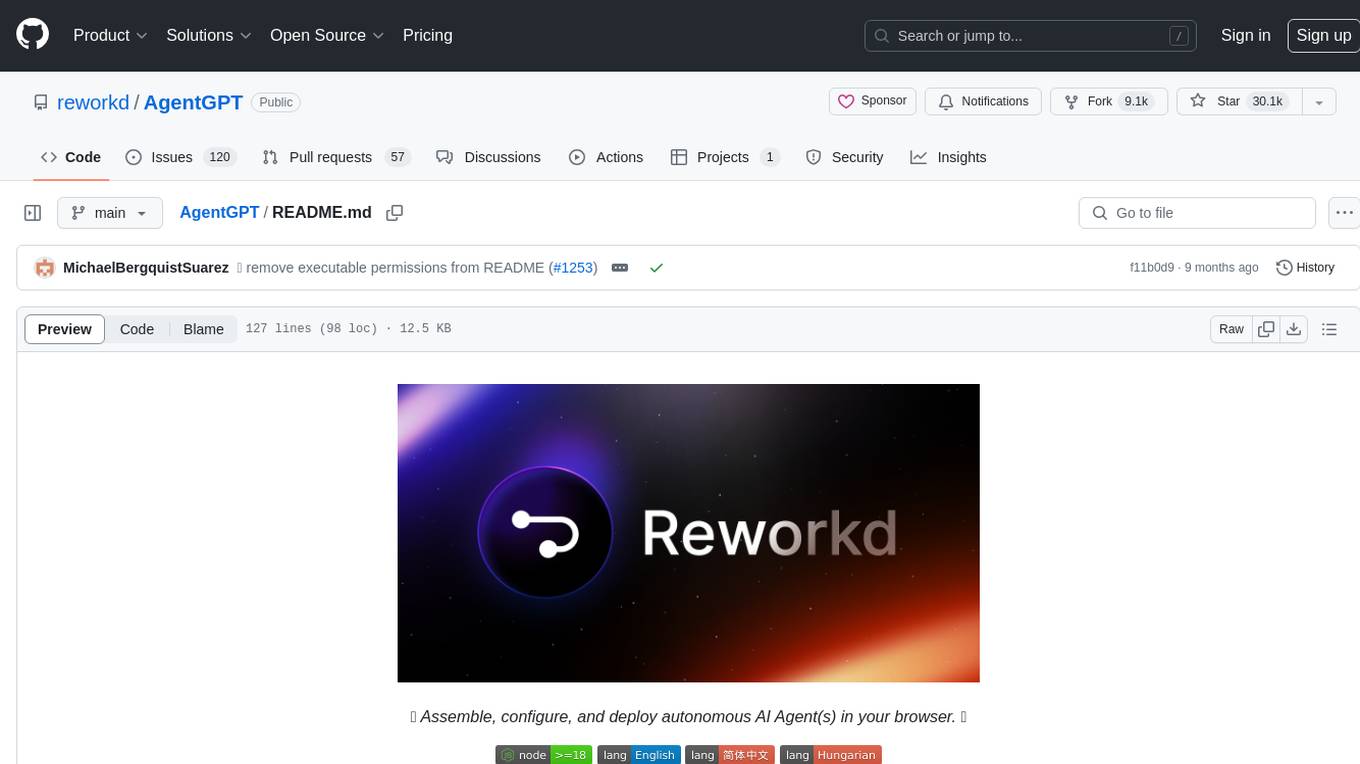
AgentGPT
AgentGPT is a platform that allows users to configure and deploy autonomous AI agents. Users can name their own custom AI and set it on any goal. The AI will think of tasks, execute them, and learn from the results to reach the goal. The platform provides a demo experience, automatic setup CLI, and a tech stack including Next.js, FastAPI, Prisma, TailwindCSS, Zod, and more. AgentGPT is designed to help users easily create and deploy AI agents for various tasks.
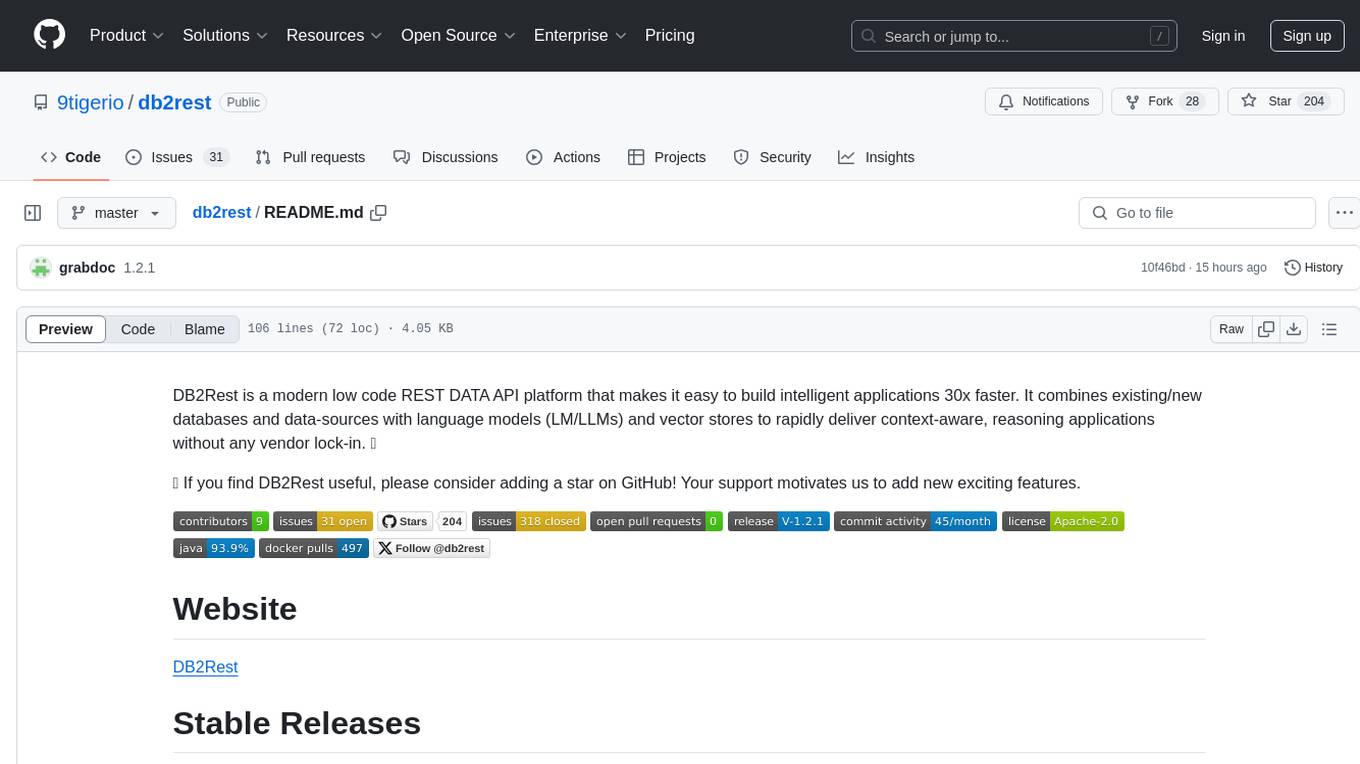
db2rest
DB2Rest is a modern low code REST DATA API platform that enables the rapid development of intelligent applications by combining databases, language models, and vector stores. It facilitates context-aware, reasoning applications without vendor lock-in. The tool accelerates application delivery, fosters faster innovation with AI, serves as a secure database gateway, and simplifies integration. It supports various databases like PostgreSQL, MySQL, MS SQL Server, Oracle, MongoDB, and more, with planned support for additional databases. Users can connect on Discord for support and contact [email protected] for inquiries.
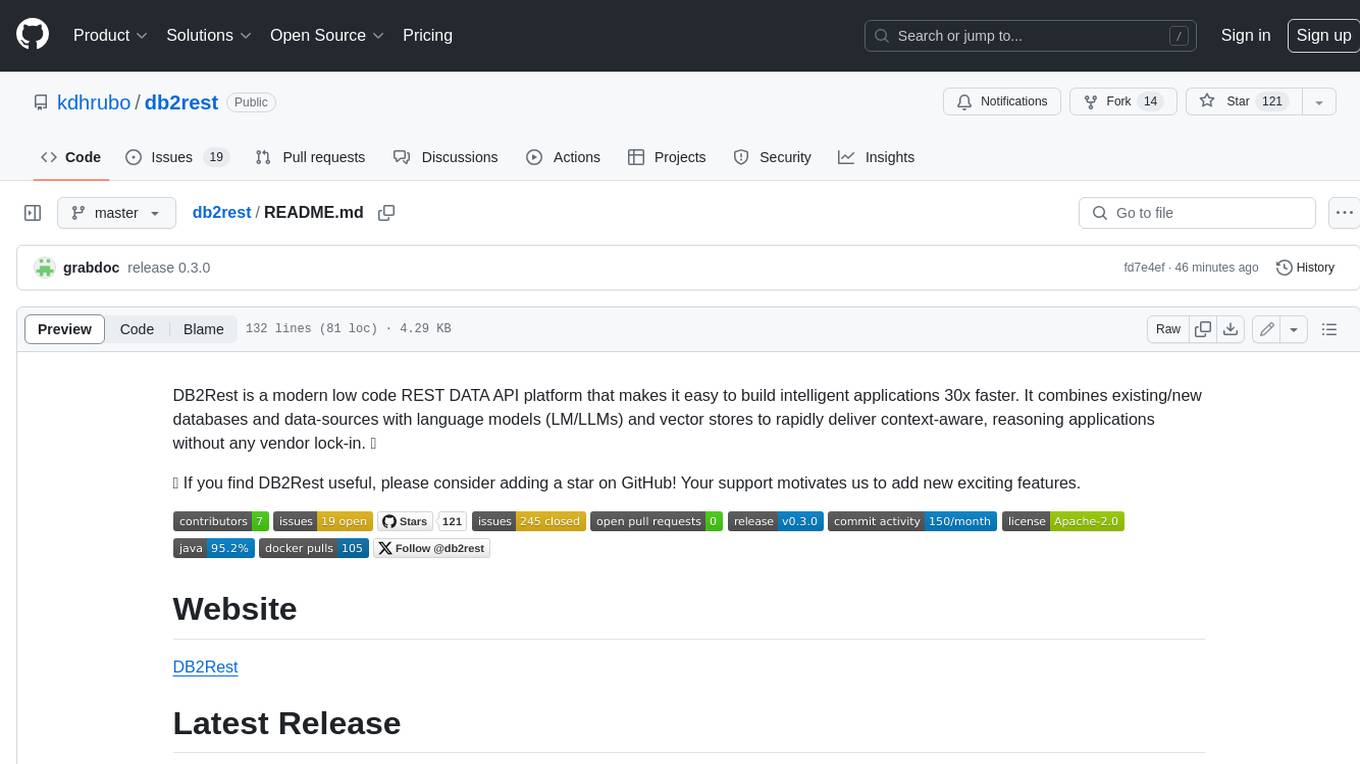
db2rest
DB2Rest is a modern low-code REST DATA API platform that simplifies the development of intelligent applications. It seamlessly integrates existing and new databases with language models (LMs/LLMs) and vector stores, enabling the rapid delivery of context-aware, reasoning applications without vendor lock-in.
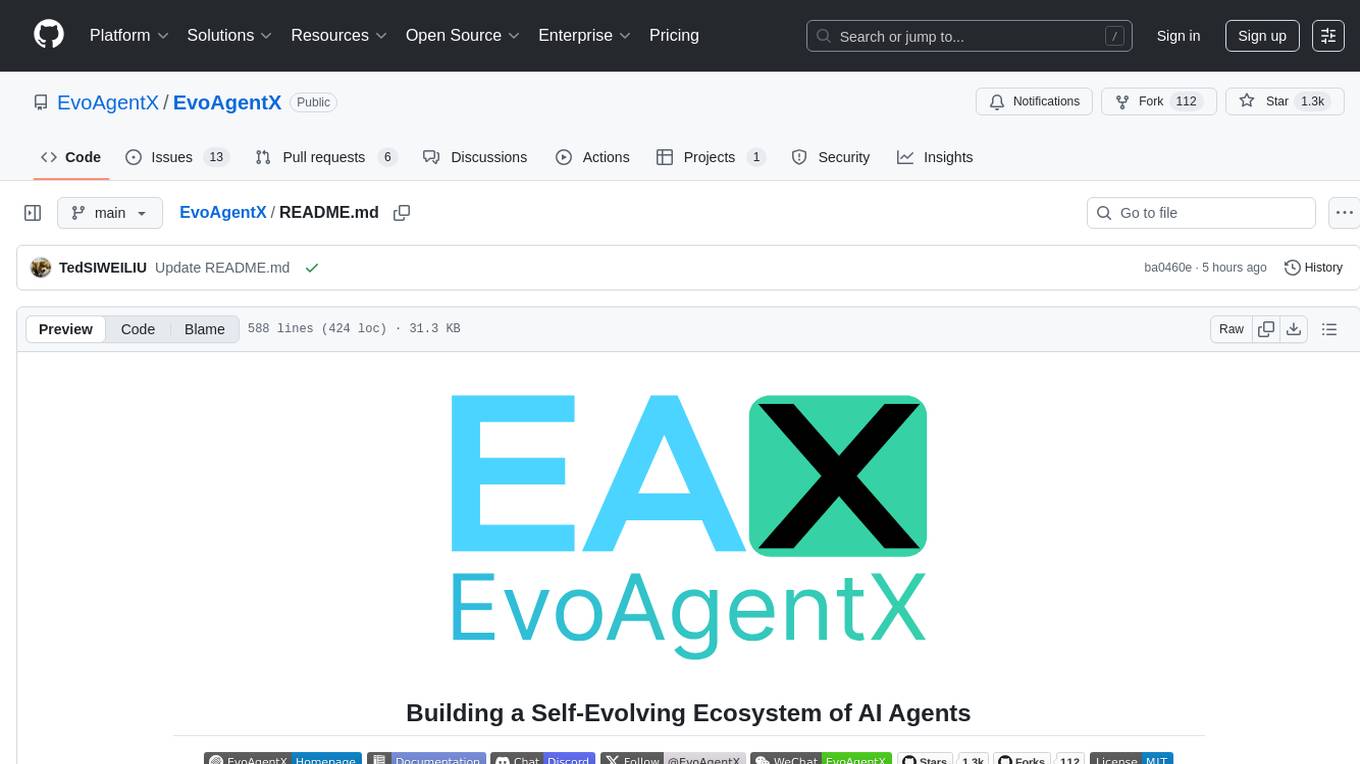
EvoAgentX
EvoAgentX is an open-source framework for building, evaluating, and evolving LLM-based agents or agentic workflows in an automated, modular, and goal-driven manner. It enables developers and researchers to move beyond static prompt chaining or manual workflow orchestration by introducing a self-evolving agent ecosystem. The framework includes features such as agent workflow autoconstruction, built-in evaluation, self-evolution engine, plug-and-play compatibility, comprehensive built-in tools, memory module support, and human-in-the-loop interactions.
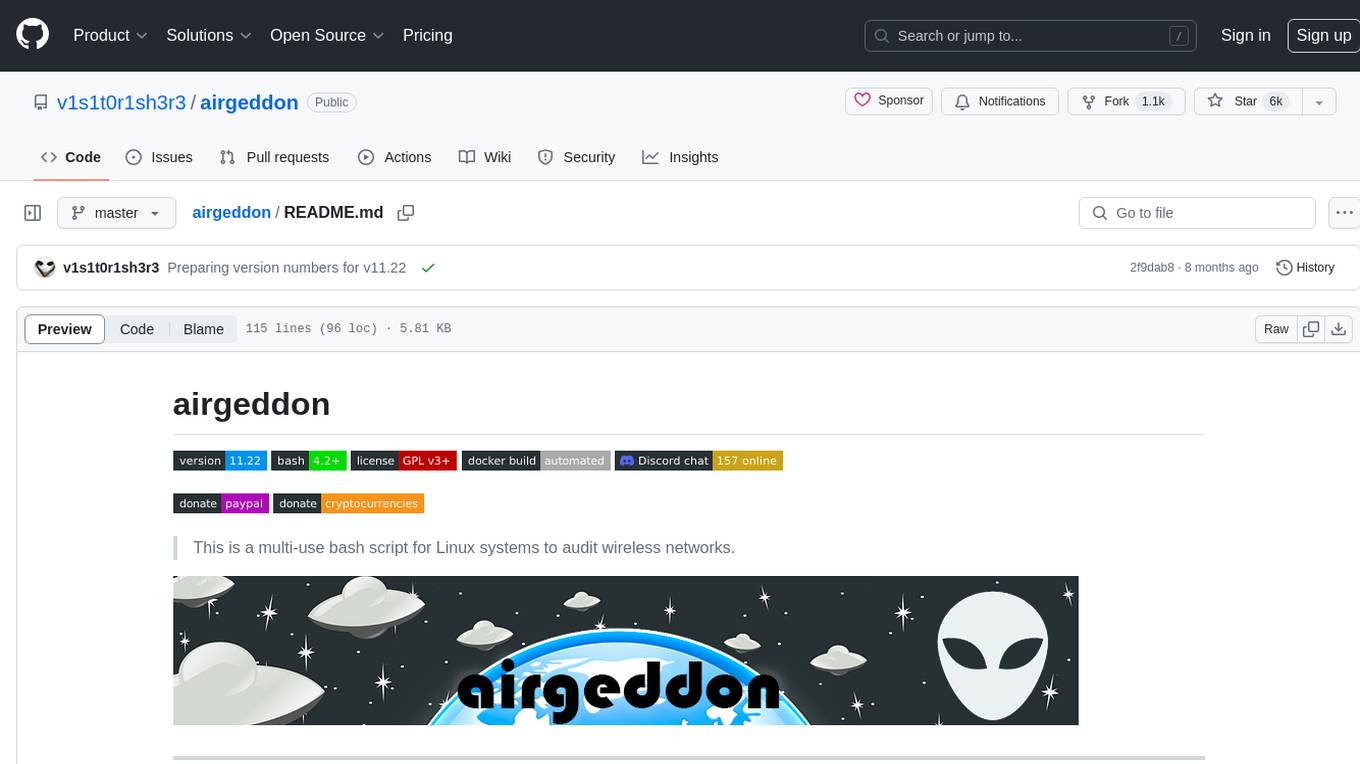
airgeddon
Airgeddon is a versatile bash script designed for Linux systems to conduct wireless network audits. It provides a comprehensive set of features and tools for auditing and securing wireless networks. The script is user-friendly and offers functionalities such as scanning, capturing handshakes, deauth attacks, and more. Airgeddon is regularly updated and supported, making it a valuable tool for both security professionals and enthusiasts.
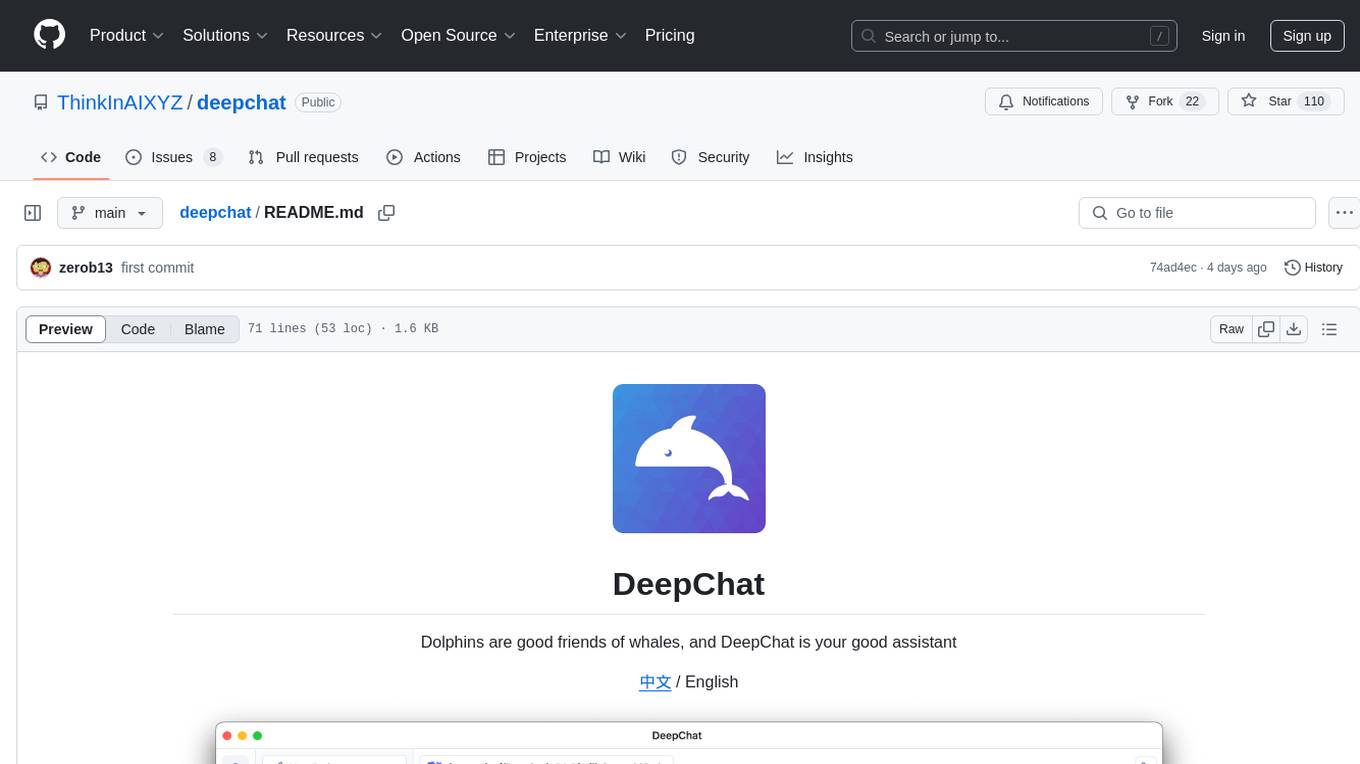
deepchat
DeepChat is a versatile chat tool that supports multiple model cloud services and local model deployment. It offers multi-channel chat concurrency support, platform compatibility, complete Markdown rendering, and easy usability with a comprehensive guide. The tool aims to enhance chat experiences by leveraging various AI models and ensuring efficient conversation management.
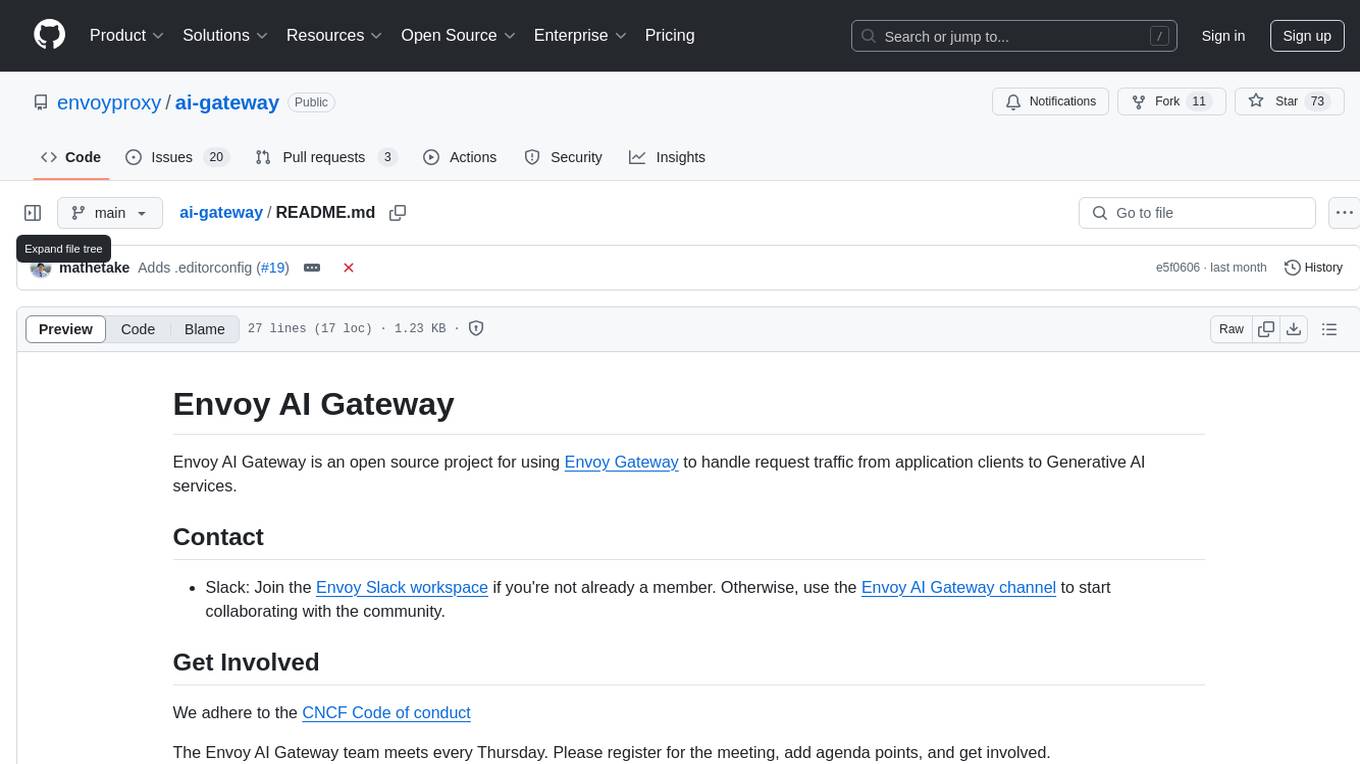
ai-gateway
Envoy AI Gateway is an open source project that utilizes Envoy Gateway to manage request traffic from application clients to Generative AI services. The project aims to provide a seamless and efficient solution for handling communication between clients and AI services. It is designed to enhance the performance and scalability of AI applications by leveraging the capabilities of Envoy Gateway. The project welcomes contributions from the community and encourages collaboration to further develop and improve the functionality of the AI Gateway.
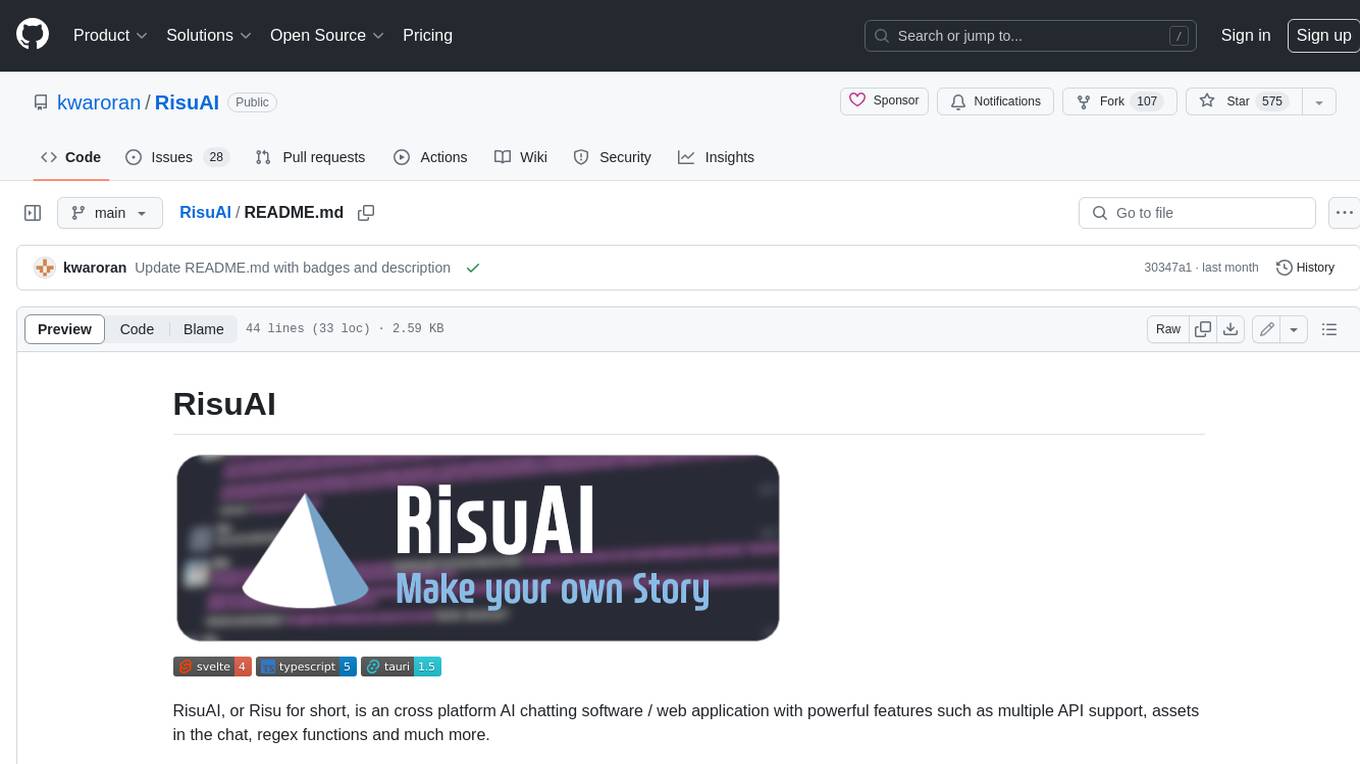
RisuAI
RisuAI, or Risu for short, is a cross-platform AI chatting software/web application with powerful features such as multiple API support, assets in the chat, regex functions, and much more.
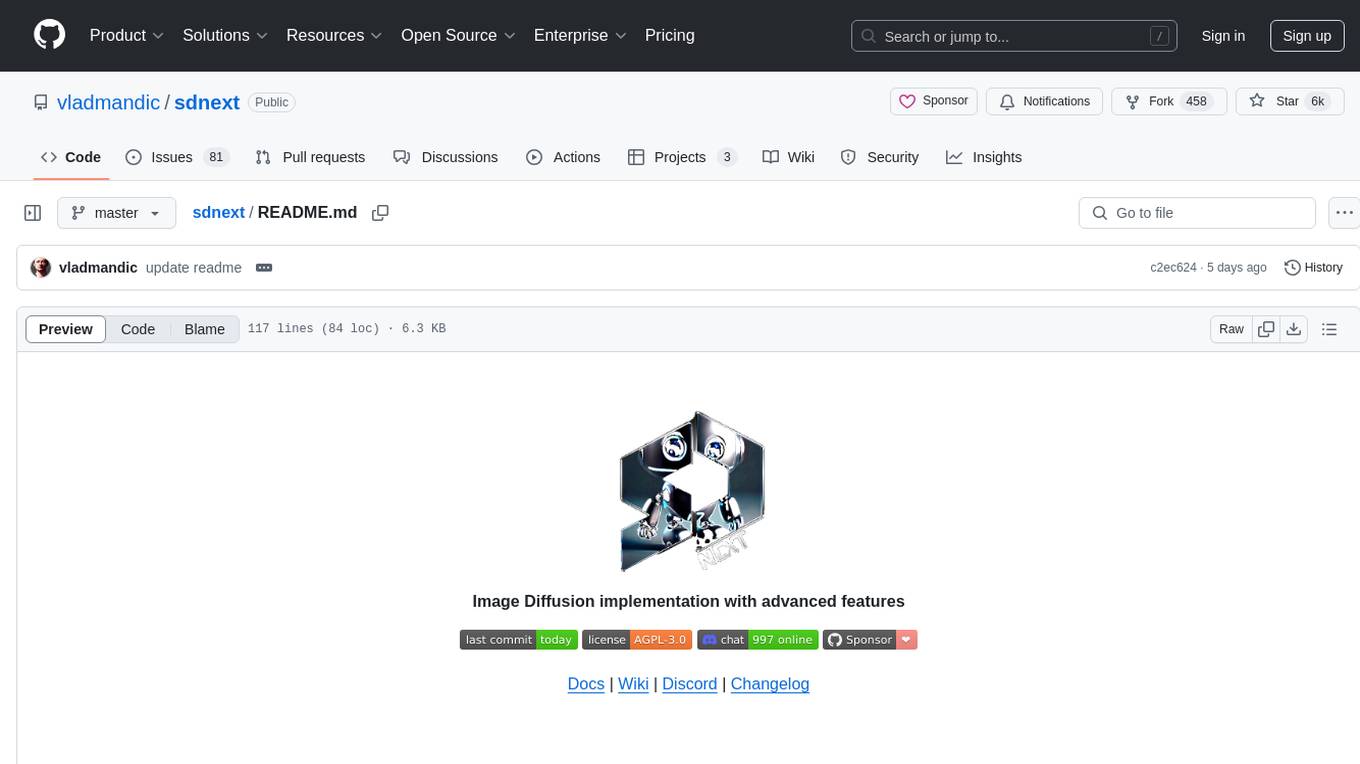
sdnext
SD.Next is an Image Diffusion implementation with advanced features. It offers multiple UI options, diffusion models, and built-in controls for text, image, batch, and video processing. The tool is multiplatform, supporting Windows, Linux, MacOS, nVidia, AMD, IntelArc/IPEX, DirectML, OpenVINO, ONNX+Olive, and ZLUDA. It provides optimized processing with the latest torch developments, including model compile, quantize, and compress functionalities. SD.Next also features Interrogate/Captioning with various models, queue management, automatic updates, and mobile compatibility.

GPTSwarm
GPTSwarm is a graph-based framework for LLM-based agents that enables the creation of LLM-based agents from graphs and facilitates the customized and automatic self-organization of agent swarms with self-improvement capabilities. The library includes components for domain-specific operations, graph-related functions, LLM backend selection, memory management, and optimization algorithms to enhance agent performance and swarm efficiency. Users can quickly run predefined swarms or utilize tools like the file analyzer. GPTSwarm supports local LM inference via LM Studio, allowing users to run with a local LLM model. The framework has been accepted by ICML2024 and offers advanced features for experimentation and customization.
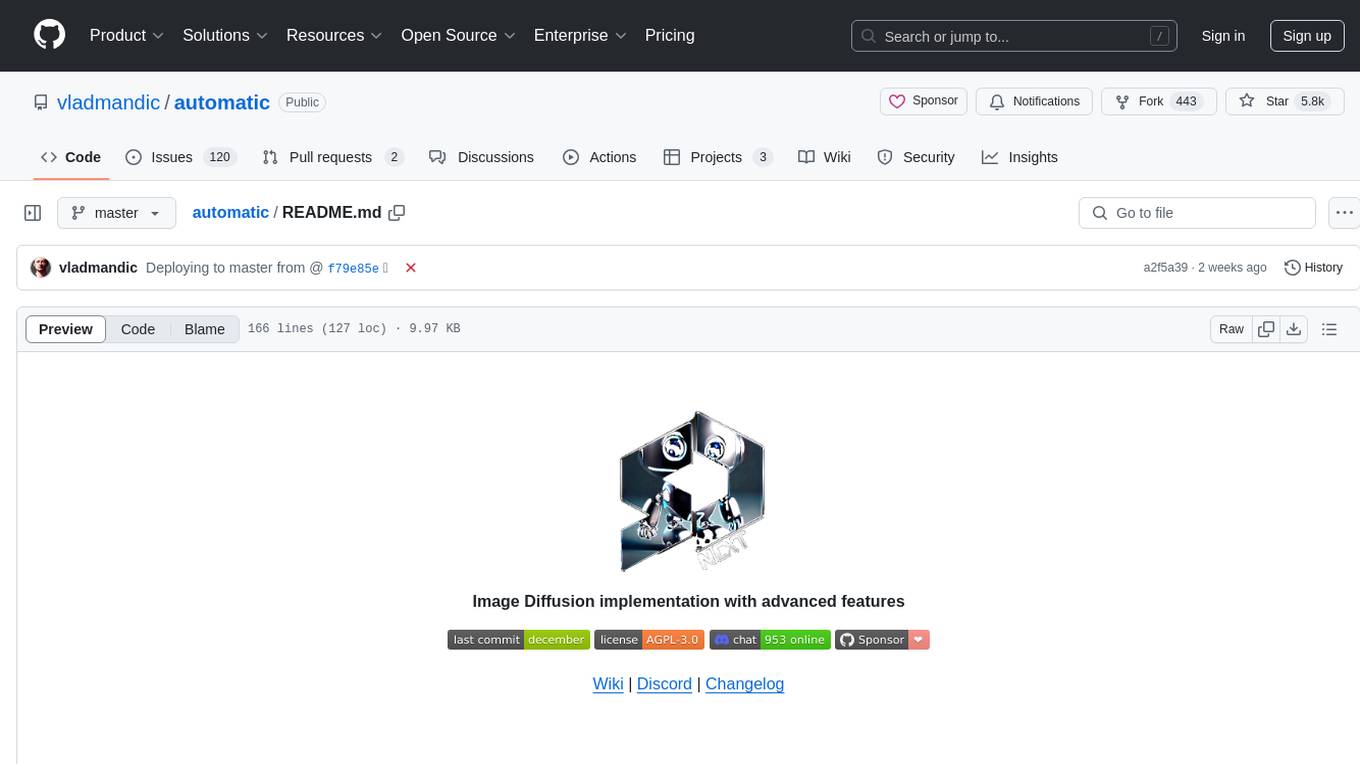
automatic
Automatic is an Image Diffusion implementation with advanced features. It supports multiple diffusion models, built-in control for text, image, batch, and video processing, and is compatible with various platforms and backends. The tool offers optimized processing with the latest torch developments, built-in support for torch.compile, and multiple compile backends. It also features platform-specific autodetection, queue management, enterprise-level logging, and a built-in installer with automatic updates and dependency management. Automatic is mobile compatible and provides a main interface using StandardUI and ModernUI.
For similar tasks

AutoAudit
AutoAudit is an open-source large language model specifically designed for the field of network security. It aims to provide powerful natural language processing capabilities for security auditing and network defense, including analyzing malicious code, detecting network attacks, and predicting security vulnerabilities. By coupling AutoAudit with ClamAV, a security scanning platform has been created for practical security audit applications. The tool is intended to assist security professionals with accurate and fast analysis and predictions to combat evolving network threats.

hound
Hound is a security audit automation pipeline for AI-assisted code review that mirrors how expert auditors think, learn, and collaborate. It features graph-driven analysis, sessionized audits, provider-agnostic models, belief system and hypotheses, precise code grounding, and adaptive planning. The system employs a senior/junior auditor pattern where the Scout actively navigates the codebase and annotates knowledge graphs while the Strategist handles high-level planning and vulnerability analysis. Hound is optimized for small-to-medium sized projects like smart contract applications and is language-agnostic.
gigachad-grc
A comprehensive, modular, containerized Governance, Risk, and Compliance (GRC) platform built with modern technologies. Manage your entire security program from compliance tracking to risk management, third-party assessments, and external audits. The platform includes specialized modules for Compliance, Data Management, Risk Management, Third-Party Risk Management, Trust, Audit, Tools, AI & Automation, and Administration. It offers features like controls management, frameworks assessment, policies lifecycle management, vendor risk management, security questionnaires, knowledge base, audit management, awareness training, phishing simulations, AI-powered risk scoring, and MCP server integration. The tech stack includes Node.js, TypeScript, React, PostgreSQL, Keycloak, Traefik, Redis, and RustFS for storage.
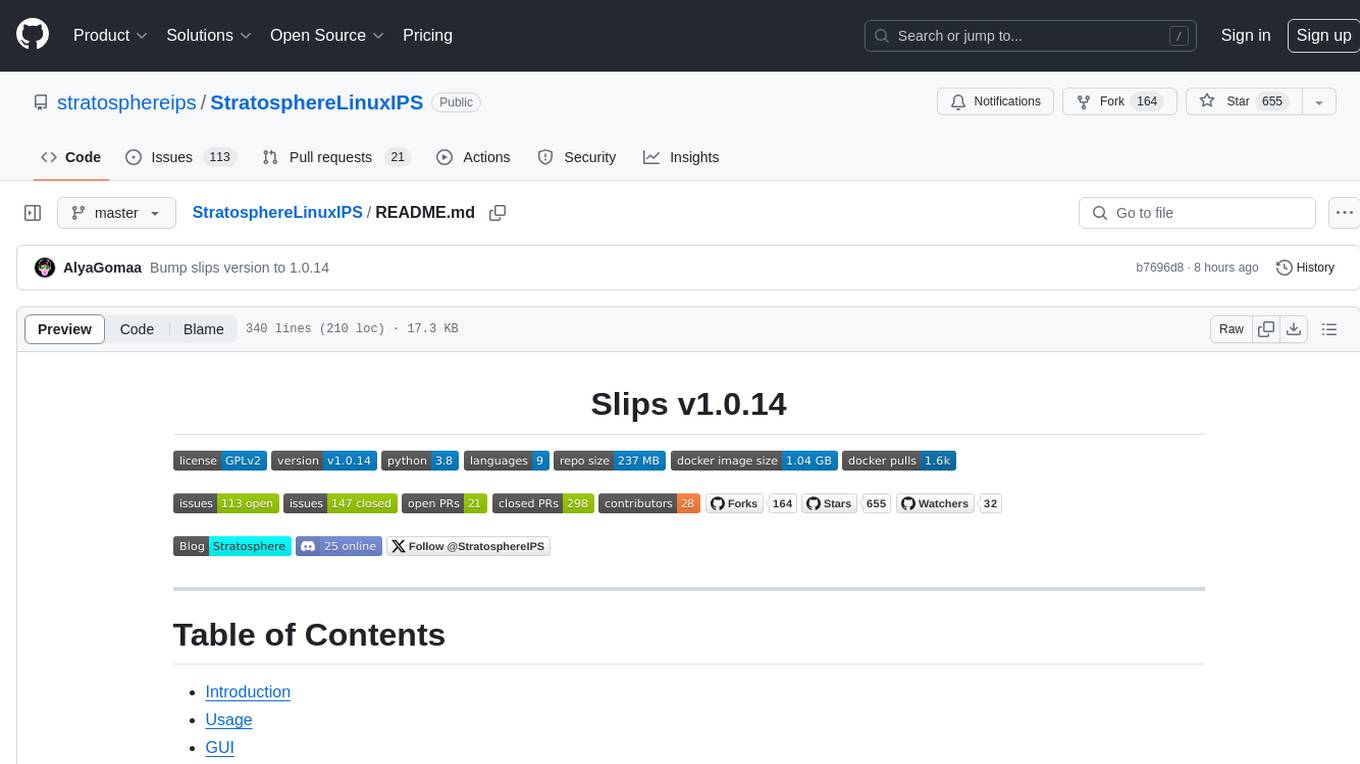
StratosphereLinuxIPS
Slips is a powerful endpoint behavioral intrusion prevention and detection system that uses machine learning to detect malicious behaviors in network traffic. It can work with network traffic in real-time, PCAP files, and network flows from tools like Suricata, Zeek/Bro, and Argus. Slips threat detection is based on machine learning models, threat intelligence feeds, and expert heuristics. It gathers evidence of malicious behavior and triggers alerts when enough evidence is accumulated. The tool is Python-based and supported on Linux and MacOS, with blocking features only on Linux. Slips relies on Zeek network analysis framework and Redis for interprocess communication. It offers a graphical user interface for easy monitoring and analysis.
For similar jobs
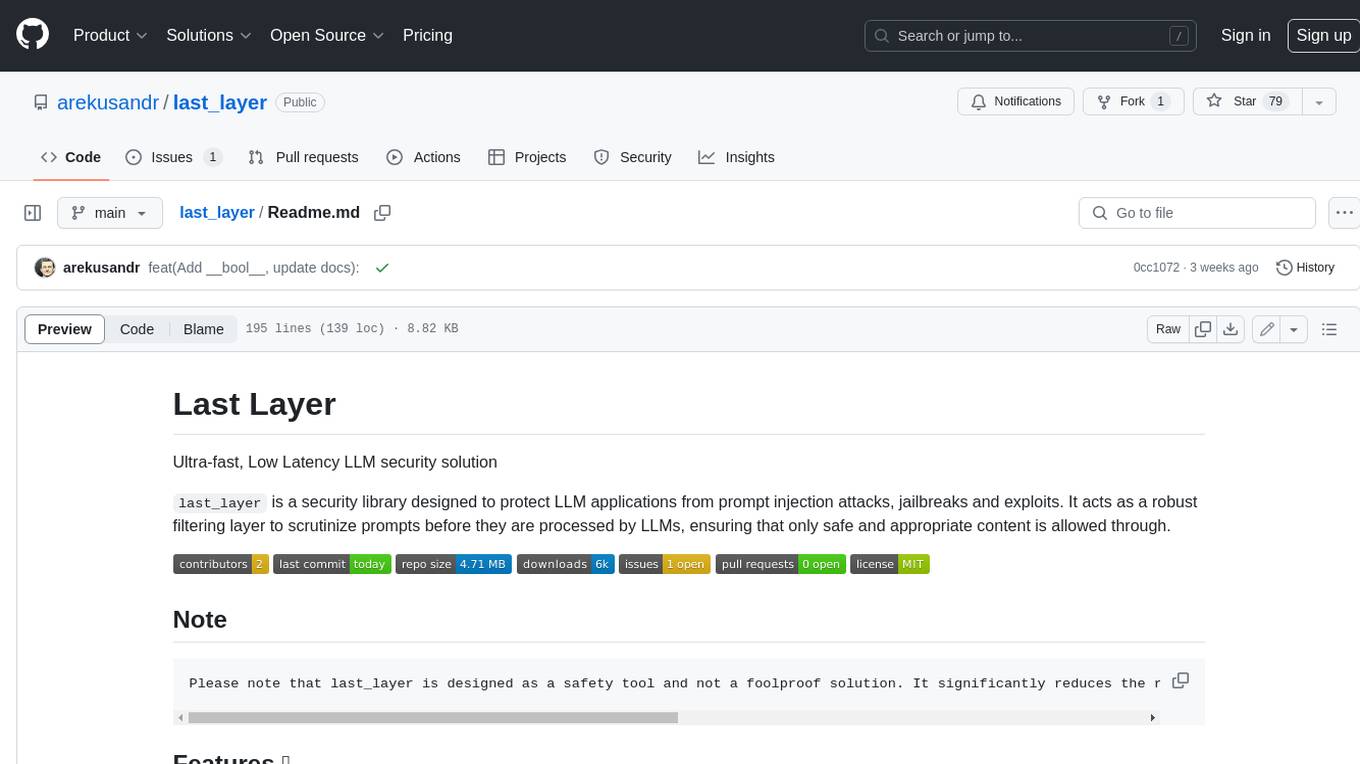
last_layer
last_layer is a security library designed to protect LLM applications from prompt injection attacks, jailbreaks, and exploits. It acts as a robust filtering layer to scrutinize prompts before they are processed by LLMs, ensuring that only safe and appropriate content is allowed through. The tool offers ultra-fast scanning with low latency, privacy-focused operation without tracking or network calls, compatibility with serverless platforms, advanced threat detection mechanisms, and regular updates to adapt to evolving security challenges. It significantly reduces the risk of prompt-based attacks and exploits but cannot guarantee complete protection against all possible threats.
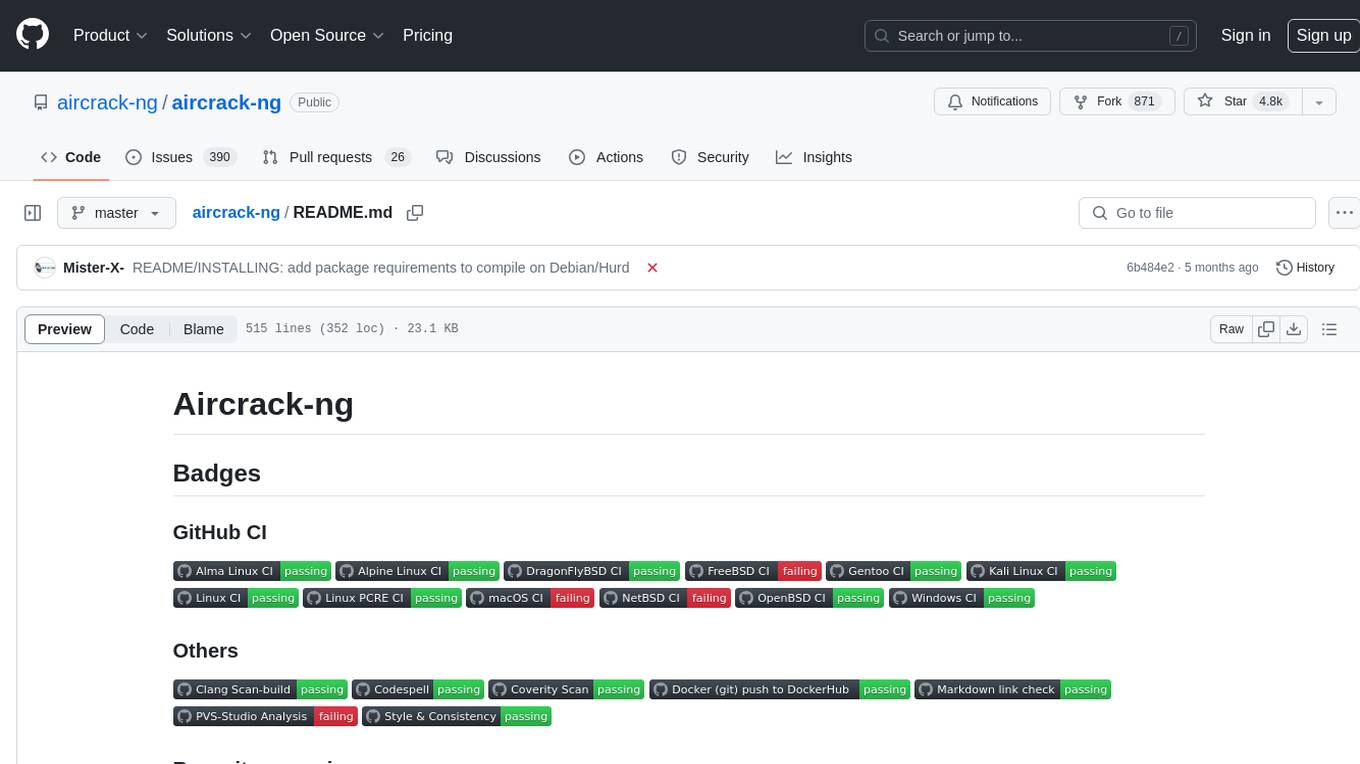
aircrack-ng
Aircrack-ng is a comprehensive suite of tools designed to evaluate the security of WiFi networks. It covers various aspects of WiFi security, including monitoring, attacking (replay attacks, deauthentication, fake access points), testing WiFi cards and driver capabilities, and cracking WEP and WPA PSK. The tools are command line-based, allowing for extensive scripting and have been utilized by many GUIs. Aircrack-ng primarily works on Linux but also supports Windows, macOS, FreeBSD, OpenBSD, NetBSD, Solaris, and eComStation 2.
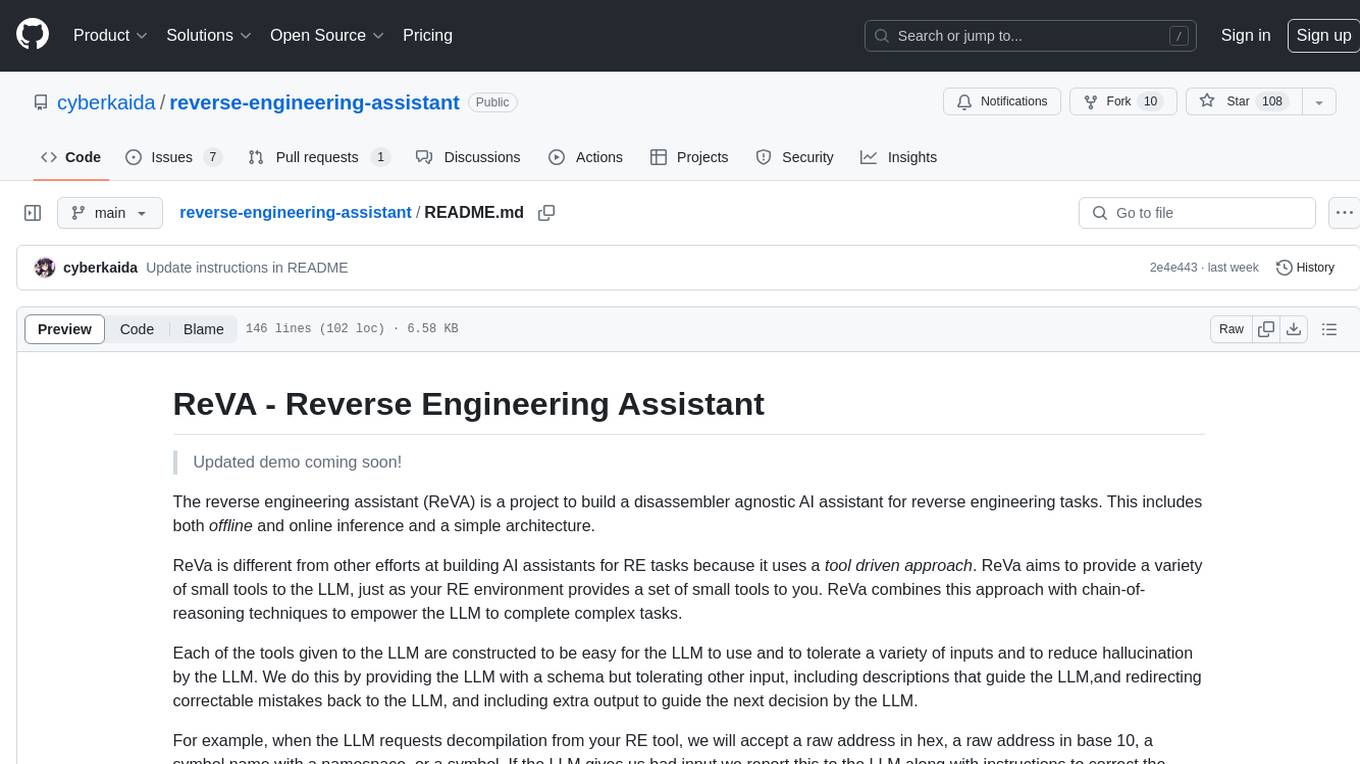
reverse-engineering-assistant
ReVA (Reverse Engineering Assistant) is a project aimed at building a disassembler agnostic AI assistant for reverse engineering tasks. It utilizes a tool-driven approach, providing small tools to the user to empower them in completing complex tasks. The assistant is designed to accept various inputs, guide the user in correcting mistakes, and provide additional context to encourage exploration. Users can ask questions, perform tasks like decompilation, class diagram generation, variable renaming, and more. ReVA supports different language models for online and local inference, with easy configuration options. The workflow involves opening the RE tool and program, then starting a chat session to interact with the assistant. Installation includes setting up the Python component, running the chat tool, and configuring the Ghidra extension for seamless integration. ReVA aims to enhance the reverse engineering process by breaking down actions into small parts, including the user's thoughts in the output, and providing support for monitoring and adjusting prompts.

AutoAudit
AutoAudit is an open-source large language model specifically designed for the field of network security. It aims to provide powerful natural language processing capabilities for security auditing and network defense, including analyzing malicious code, detecting network attacks, and predicting security vulnerabilities. By coupling AutoAudit with ClamAV, a security scanning platform has been created for practical security audit applications. The tool is intended to assist security professionals with accurate and fast analysis and predictions to combat evolving network threats.
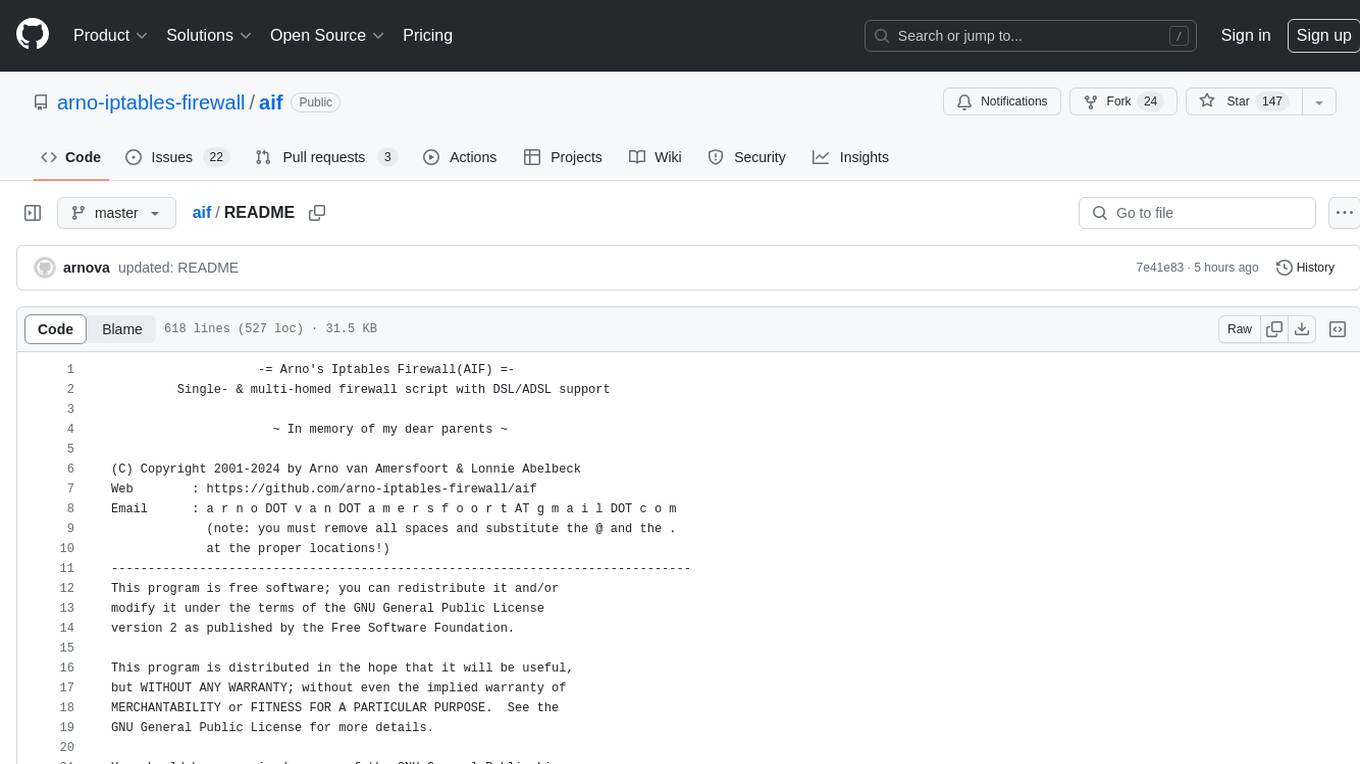
aif
Arno's Iptables Firewall (AIF) is a single- & multi-homed firewall script with DSL/ADSL support. It is a free software distributed under the GNU GPL License. The script provides a comprehensive set of configuration files and plugins for setting up and managing firewall rules, including support for NAT, load balancing, and multirouting. It offers detailed instructions for installation and configuration, emphasizing security best practices and caution when modifying settings. The script is designed to protect against hostile attacks by blocking all incoming traffic by default and allowing users to configure specific rules for open ports and network interfaces.
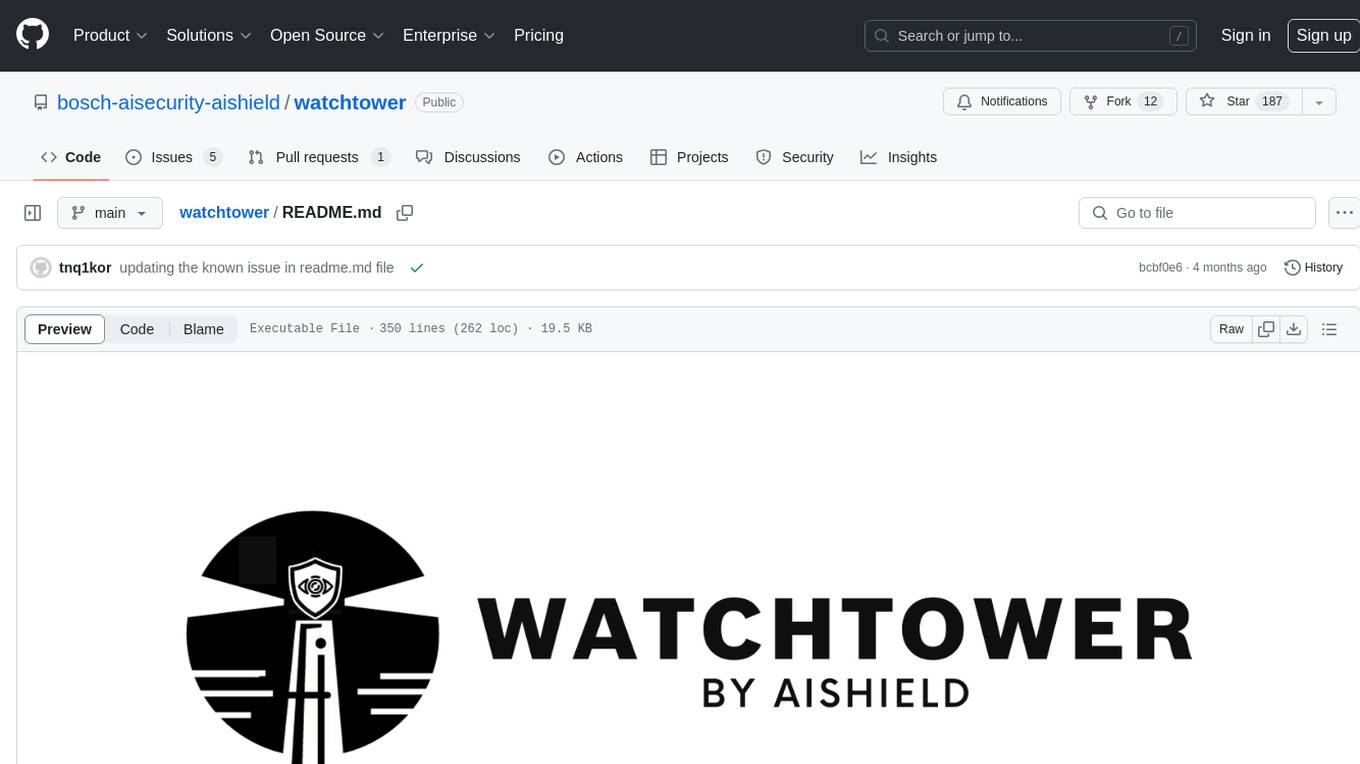
watchtower
AIShield Watchtower is a tool designed to fortify the security of AI/ML models and Jupyter notebooks by automating model and notebook discoveries, conducting vulnerability scans, and categorizing risks into 'low,' 'medium,' 'high,' and 'critical' levels. It supports scanning of public GitHub repositories, Hugging Face repositories, AWS S3 buckets, and local systems. The tool generates comprehensive reports, offers a user-friendly interface, and aligns with industry standards like OWASP, MITRE, and CWE. It aims to address the security blind spots surrounding Jupyter notebooks and AI models, providing organizations with a tailored approach to enhancing their security efforts.
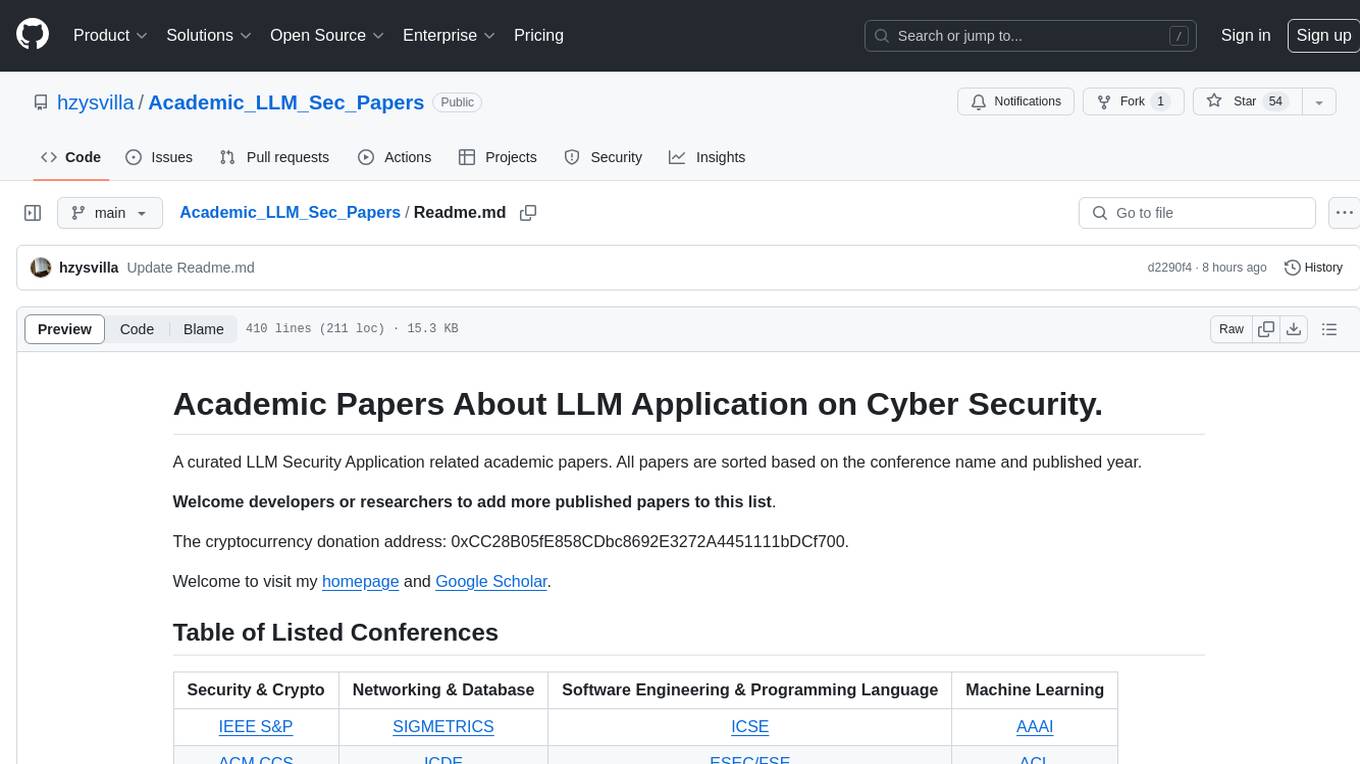
Academic_LLM_Sec_Papers
Academic_LLM_Sec_Papers is a curated collection of academic papers related to LLM Security Application. The repository includes papers sorted by conference name and published year, covering topics such as large language models for blockchain security, software engineering, machine learning, and more. Developers and researchers are welcome to contribute additional published papers to the list. The repository also provides information on listed conferences and journals related to security, networking, software engineering, and cryptography. The papers cover a wide range of topics including privacy risks, ethical concerns, vulnerabilities, threat modeling, code analysis, fuzzing, and more.
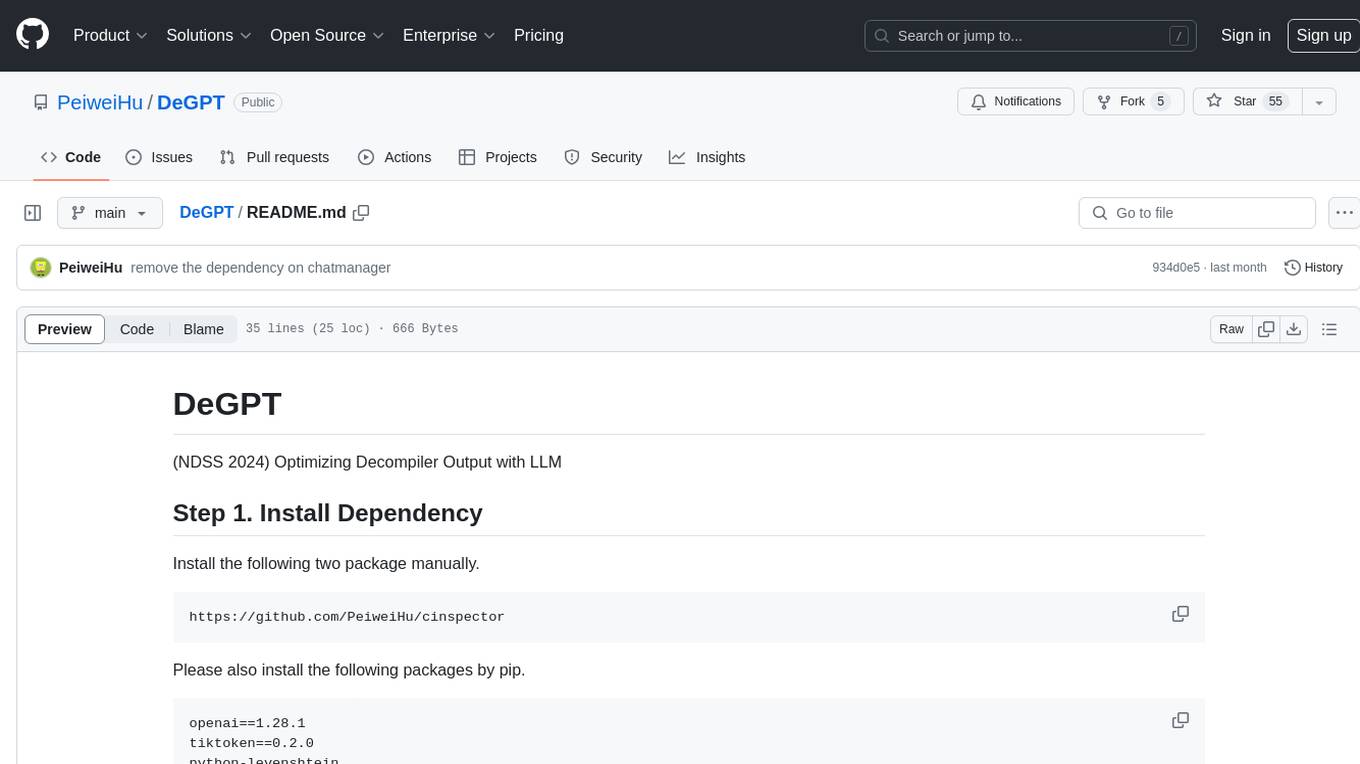
DeGPT
DeGPT is a tool designed to optimize decompiler output using Large Language Models (LLM). It requires manual installation of specific packages and setting up API key for OpenAI. The tool provides functionality to perform optimization on decompiler output by running specific scripts.





